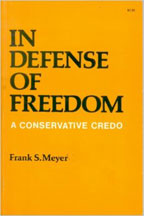
FGF E-Package
The Urban Conservative
September 26, 2013
Reagan Advisor Proposes Plan to Restore America:
Book Review of Donald Devine's
America's Way Back
by Herbert W. Stupp
fitzgerald griffin foundation

America's Way Back: Reclaiming Freedom, Tradition, and Constitution
by Donald J. Devine (ISI Books, Wilmington, Delaware, 2013), 288 pagesNEW YORK, NY — When I first heard Dr. Don Devine speak at a seminar for undergraduate students some decades ago, he was explaining the tremendous influence of British philosopher John Locke on the Framers of the U. S. Constitution. In his intellectual yet highly readable opus, America's Way Back, Dr. Devine argues for a new framework for the nation, and especially political conservatives, to recapture the ideals of those Framers and to redirect our national government. And yes, he draws on the wisdom of Locke and Madison, Hamilton, Jay, Jefferson, Adams and Washington, as well as the other great minds who influenced them.
For too long an underappreciated intellectual, Don Devine is a bona fide son of New York. Born in the suburbs but raised mostly in Flatbush, he earned his B. A. at St. John's (then in Brooklyn), his M.A. at CUNY's Brooklyn College, and his Ph.D. at Syracuse University, and then moved south. During his career as a professor of political science at the University of Maryland, Don ran as an unsuccessful candidate for comptroller of the State of Maryland in 1978. He soon played an influential role in Ronald Reagan's successful run for the White House in 1980, and the new President recognized Devine's intellect and embrace of conservative principles. Reagan named Devine to be his first Director of the Office of Personnel Management, the top public administration job in the nation.
Devine did not disappoint. He advised President Reagan during the air traffic controllers' illegal strike, and he embarked on efforts to reform the civil service system that had stymied so many presidents and federal administrators, to say nothing of the general public. Devine introduced and implemented a highly successful system of Merit Pay for federal executives and managers, improving not only performance in the government workforce, but also enhancing harmony within the ranks.
In America's Way Back, Don Devine draws upon his first-hand knowledge of government's failures and successes to lay out a plan for a leaner, more effective, and democratically-based state. Not surprisingly, Devine's goals for governmental structure are in line with the Framers, and he cites Locke, Madison, and others whom he rightly admires.
Three primary themes recur throughout Devine's book:
• First, that the political philosophy of "progressivism" has corrupted both major parties over the years. Dr. Devine points to Woodrow Wilson's writings, where decades before his presidency, he argued for centralized "scientific" management of government by "experts" who need to pay little heed to elections and the will of the people. Wilson, an admirer of Prussia's centralized programs, including the first large national health insurance plan, complained that the "Federal government lacks strength because its powers are divided."
As Devine eloquently counters, this division of powers is precisely the point. The authors of the Declaration of Independence, the Federalist Papers, and the Constitution were responding to the centralized powers of a king by creating a government wherein the powers of one individual or faction would always be checked by another. Still today, Dr. Devine says, too many Republicans join Democrats in supporting federal bloat, expensive programs at odds with Constitutional intent, and creeping debt to be paid off by future generations.
Still today, Dr. Devine says, too many Republicans join Democrats in supporting federal bloat, expensive programs at odds with Constitutional intent, and creeping debt to be paid off by future generations.
• Second, the author documents how overreach by the federal government has not only been expensive, but that federal programs and intervention have largely been counterproductive. One persuasive example relates to the response to economic depressions and recessions. Presidents Hoover, Franklin Roosevelt, and Obama all opted for expensive "stimulus" programs, resulting in lots of spending, yet producing only more misery for the American people. In contrast, Presidents Harding and Reagan, in response to deep recessions, rejected stimulus schemes. In fact, these leaders headed in the opposite direction, reducing taxes and excess regulation. The results: Harding's policies led to the "Roaring Twenties," while Reagan's led to the greatest economic boom in world history.
Devine has plenty of such instructive analyses and anecdotes to bolster his points.
• Third, the author argues for a renewed appreciation of "fusionism" as the philosophy to transport us to the responsive, limited, properly-ordered government we want and need.
To New Yorkers long used to a multiparty system, "fusionism" conjures up the old Fusion Party that helped to catapult Fiorello LaGuardia into City Hall, over the strenuous opposition of Tammany Hall. The Republican Party in Ohio was originally called the Fusion Party in 1854. The term still suggests to New Yorkers that a candidate is endorsed by more than one party in a "fusion," or marriage of interests.
But the national understanding of fusionism as a political philosophy calls up the Framers of the republic, who created a tension between the traditions of society and exigencies of government on the one hand, and the libertarian, checks-and-balances means of addressing problems and issues on the other hand. The 20th century's notable proponents of fusionism included National Review's William F. Buckley Jr. and fellow editor Frank S. Meyer, a one-time communist who came to embrace the American cause. Devine's book was timed to coincide with the 50th anniversary of Meyer's greatest work, the book In Defense of Freedom: A Conservative Credo.
The libertarianism versus traditionalism debate is as robust as ever in 2013. When it was revealed that the National Security Agency (NSA) has been maintaining an immense catalogue of phone numbers called and e-mails sent, we saw libertarian U.S. Senator Rand Paul (R-Kentucky) oppose virtually all such surveillance as violative of individual freedom. Critical of Paul, however, was security-oriented Governor Chris Christie (R-New Jersey), who argued that muscular intelligence operations are needed to keep Americans safe in the post-911 world.
The debate hearkens back to the founding of the republic. While fusionism is the effort to unite two major wings of the Republican Party, in a recent Congressional vote, significant numbers of Democrats voted with Republicans to support the NSA, while a different coalition of Democrats and Republicans opposed them, voting to stop perceived unreasonable surveillance.
The modern political leader who most successfully blended the libertarian and traditionalist wings of the Republican party into a cohesive governing coalition was Ronald Reagan. He campaigned and ran the government with the principles of one of his favorite economists, Nobel laureate Dr. Friedrich Hayek, in mind: "A successful free society will always in large measure be a tradition-bound society." Adam Smith himself suggested that freedom and capitalism would flourish best in a virtuous, Christian (in his time) society.
Devine capsulizes the fusionist philosophy as "…a synthesis of traditional Western values and the need for individual human freedom to achieve them."
Can "fusionism," a concept known mostly to Constitutional scholars and "inside-baseball" debaters within the Republican party, capture large swaths of the American public and electorate, influencing or even winning upcoming elections? Devine challenges leaders reading his book to step up to make the case for more limited, less expensive, unobtrusive government.
This book is, indeed, for leaders. Readers will come upon terms like positivism, secular rationality, cosmological unity, and others not covered in sophomore political science, or even in most graduate courses. But hang in there with Dr. Devine. You will learn about concepts your university should have introduced to you, only now via Devine's graceful writing, incisive analyses, instructive anecdotes, and a plan to restore America's greatness — with your assistance.
The Urban Conservative archives
The Urban Conservative is copyright © 2013 by Herbert W. Stupp. All rights reserved.
Herbert W. Stupp served in the Reagan, Bush 41, and Giuliani administrations.
A version of this article appeared in Human Events.See a complete biographical sketch.
To subscribe or donate to the FGF E-Package online or send a check to:
P.O. Box 1383
Vienna, VA 22183
© 2013 Fitzgerald Griffin Foundation
